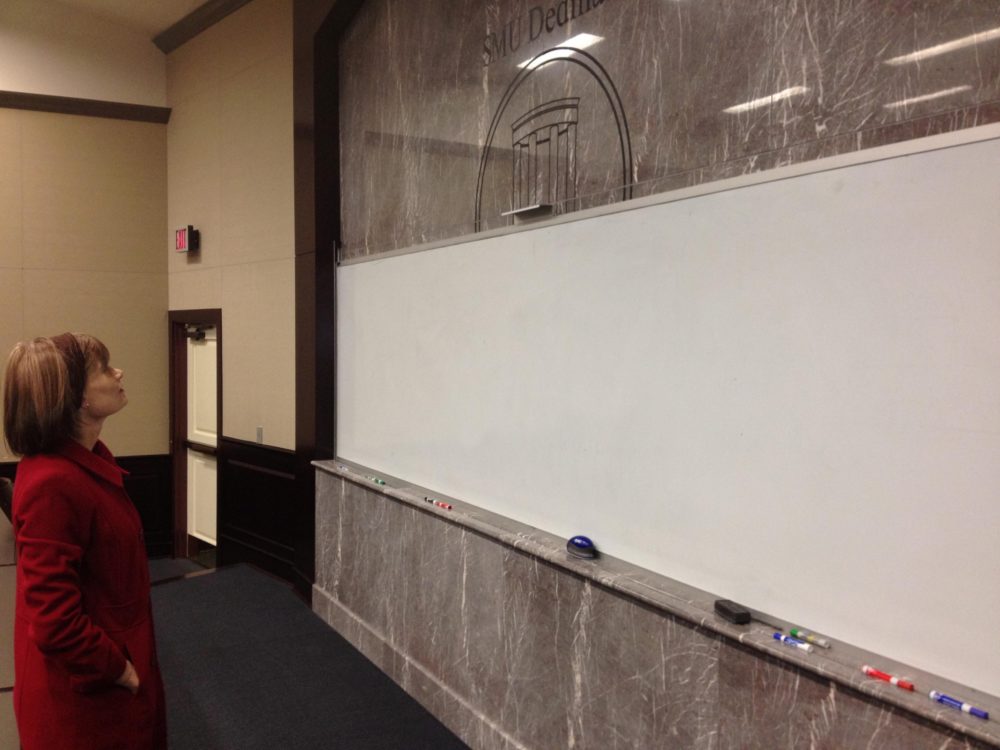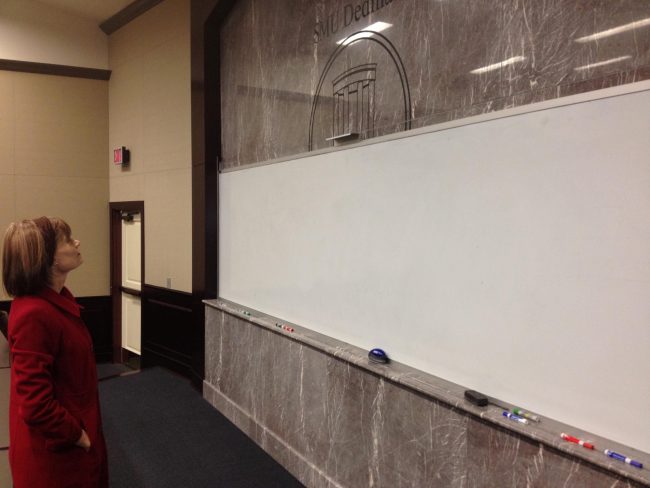
SMU associate law professor Sarah Tran looks at the classroom where she taught via Skype for 28 days last fall while in Baylor Medical Center. (Eric Sheffield / The Daily Campus)
Sarah Tran thought she had a cold.
“It made sense,” Tran, a SMU assistant law professor, said. “Many other faculty members were sick with colds at the time.”
However, on Oct. 13, 2012, after a week of having no voice while trying to teach property law to 80 first-year law students, Tran decided to go to the doctor. And that’s when she found out her acute myeloid leukemia, which had been in remission for four and a half years, had come back.
She would immediately have to check into the hospital for 28-days to receive treatment.
“My first thought was, ‘what am I going to do about my class?'” Tran said. “I didn’t want to just hand the reins over to someone else.”
Tran realized how difficult the law school can be for first-year students, and she said she was afraid that by letting another professor take over her class, she’d be doing them a disservice.
“Law school is very stressful. When you step into a first-year class during an exam, you can smell the stress,” Tran said. “To have the students go through half the semester and get a new professor, that would be a jolt.”
So she came up with a plan.
From 1 to 2:30 p.m. on Wednesdays and Fridays, Tran shut the door of her hospital room at Baylor Medical Center in Dallas and opened her laptop.
Back at SMU, the students used the 10 by 8ft. projector screen in the room to connect with Tran over Skype.
“I must have looked humongous,” Tran said. “I can only imagine that my nose must have been the size of a garbage can.”
But despite what she might have looked like, she was able to teach, call on students and manage a classroom like normal.
Well, almost.
“Skype definitely didn’t work perfectly,” Tran said. “There were computer glitches.”
Sometimes the call would drop, or the connection would lag for a bit. Tran also had difficulties presenting PowerPoint slides since the projector screen was being used to broadcast her face and voice.
Tran also realized there were certain things that she couldn’t do without being physically present.
“When you’re actually in the classroom, you can walk around,” Tran said. “You can look people in the eye.”
However, she did have a bit of help along the way.
Two of Tran’s former students, Rachel Quisenberry and James Arnott, helped work Skype in the lecture room and collected attendance sheets. She describes them both as “superstars.”
During the Skype sessions, Tran was always straight to business.
“She would spend maybe a minute telling us about how she was doing,” first-year law student Vanessa Murra-Kapon said. “But after that, it was just property law.”
The exception was promoting health causes. Tran let her class know that bone marrow and blood donors were saving her life.
By the end of the year, several students from her class had donated blood.
“It meant a lot to me,” Tran said. “They were all-around amazing students.”
One day during her hospital stay, the students all coordinated to wear orange, the color of leukemia awareness.
On another day, Murra-Kapon had the entire class sign a 4-foot-tall card and hand delivered it to the hospital.
“Her determination, her courage, her professionalism taught us so much throughout the semester,” Vanessa said, “It was the least we could do.”
Some classes were easier for Tran than others.
One Wednesday morning, she woke up with a fever of 105.2 degrees. She knew that other co-workers cancelled classes when they were ill, but she decided to give it a go.
“I knew it would start out rough,” Tran said, “But teaching makes me feel better.”
And, strangely enough, it did. By the time her class had ended, the fever had subsided, and it never came back.
On Nov. 10, 28 days, or 10 class periods, after she entered the hospital, Tran was released.
On Wed., Nov. 13, Property Law I filed into their classroom, expecting once again to be taught via Skype. But they got something else instead.
“When she walked into the room, everyone was confused,” Murra-Kapon said.
Tran says that she saw a look of shock in many of the students’ faces. As soon as they realized what was going on, the whole class clapped for her.
“We thought she was so brave coming back to class,” Murra-Kapon said.
But after the applause subsided, it was back to federal regulations and case studies.
“Strictly business,” Tran said.
The rest of the semester finished out relatively calmly for the professor and her class.
Tran asked that if students were sick, they stay home, as her weakened immune system would be especially susceptible to all diseases.
But amazingly, throughout the entire Fall 2012 semester, Tran didn’t miss teaching a single class.
“She had the right to take medical leave,” Murra-Kapon said. “She could have done it without any problem and no one would have thought any less of her. But she didn’t, and I admire her so much for that.”
This semester, Tran is taking a research leave to work on her papers, but next year, she feels confident about coming back to teach.
“I feel like I’m in great shape,” Tran said. “I’ve started running again and playing volleyball. It’s odd, but I feel totally normal.”









